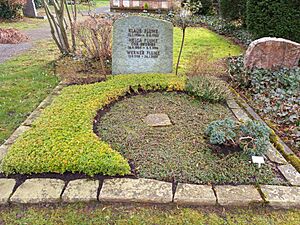Werner Flume facts for kids
Quick facts for kids
Werner Flume
|
|
|---|---|
| Born | 12 September 1908 Kamen, Kingdom of Prussia, German Empire
|
| Died | 28 January 2009 (aged 100) |
| Burial place | Central cemetery, Bad Godesberg |
Werner Flume (born September 12, 1908 – died January 28, 2009) was a German legal expert. He was a professor who taught about Roman law, private law, and tax law. He also studied legal history.
Werner Flume greatly shaped how German private law developed in modern times. People even called him a "lawyer of the century" because of his important work.
Contents
Life Story
Early Years and School
Werner Flume was born in Kamen on September 12, 1908. After finishing high school in Hamm, he started studying history and old languages. This was at the University of Tübingen in 1927.
But he soon changed his mind. He switched to studying law after hearing a lecture about German private law. In late 1927, Flume moved to the University of Bonn. He finished his law studies there, taking only one semester break in Berlin.
At Bonn, a Roman law expert named Fritz Schulz became his main teacher. In 1930, Flume passed his first big law exam. In 1931, he finished his PhD paper. It was about Roman law.
Time at Friedrich-Wilhelm University
In 1931, Flume followed his teacher, Fritz Schulz, to the Friedrich-Wilhelm University in Berlin. Flume worked there as an assistant. He started writing a major paper for his next academic step.
However, things changed when Nazi Germany began. In 1933, Fritz Schulz was forced to leave the university. This happened because of unfair laws against Jewish people. Flume lost his teacher and mentor.
At a meeting, a university leader who supported the Nazis wanted to ban Jewish professors. Flume bravely spoke out against him. This made Flume an enemy of this powerful person. This enemy tried to stop Flume's academic plans. He even tried to have Flume arrested. Flume stayed at the university until 1935.
In 1936, Flume started writing about tax law. His articles appeared in the Handelsblatt, a German business newspaper. Later, he also wrote for Der Betrieb. He became friends with Friedrich Vogel, the publisher of the Handelsblatt.
Working and Further Studies
After leaving the university, Flume completed his legal training. He passed his second state law exam in 1936. Then, he worked for a publishing company. He handled tax and company law matters.
In August 1944, he joined the Wehrmacht and took part in World War II. At the end of the war, he escaped from Russian-controlled areas. For a short time, he was a prisoner of war held by the Americans.
After the war, Flume worked as a legal advisor. He advised a publishing company and a steel factory. He then decided to continue his academic career. He started working on his next big academic paper.
In 1946, he completed this work in Bonn. This allowed him to become a university lecturer. His paper had actually been published ten years earlier in a Dutch law journal.
Teaching Career
From 1948, Flume taught as a special lecturer in Bonn. In 1949, he became a full professor at the University of Göttingen. There, he taught Roman law.
In 1953, he moved back to the University of Bonn as a professor. He first taught private and tax law. From 1957, he also took over the Roman law chair. This was the same position his teacher, Fritz Schulz, had held before he was forced to retire.
In 1959, he was asked to teach at the University of Heidelberg. But he chose to stay at the University of Bonn. He taught there until he retired in 1976. After he retired, Rolf Knütel took over his Roman law position.
Later Life
Werner Flume passed away on January 28, 2009, in Bonn. He was 100 years old.
Family Life
Werner Flume got married in March 1933.
Achievements
A professor named Thomas Lobinger called Werner Flume a "lawyer of the century." This was because of his important work in German private law.
Awards and Honors
- 1952: Became a full member of the Göttingen Academy of Sciences and Humanities.
- 1972: Became a full member of the North Rhine-Westphalian Academy of Sciences, Humanities and the Arts.
- 1977: Became a corresponding member of the British Academy.
- 1982: Became a corresponding member of the Bavarian Academy of Sciences and Humanities.
- January 19, 1982: Received an honorary doctorate from the University of Regensburg.
Special Books
Two special books were written in his honor.
Main Published Works
A full list of all of Werner Flume's works (up to 1978) can be found in a book published in his honor in 1978.
 | Dorothy Vaughan |
 | Charles Henry Turner |
 | Hildrus Poindexter |
 | Henry Cecil McBay |


